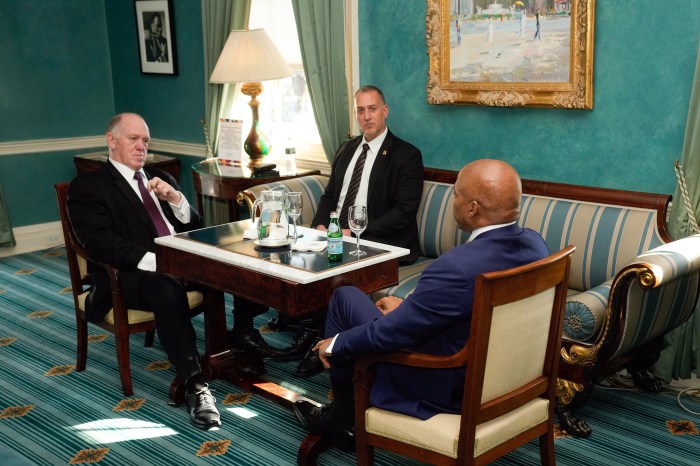
This year, the federal holiday commemorating the birthday of slain civil rights leader and Nobel Peace Prize winner Rev. Martin Luther King Jr. vibrates with renewed importance.
The new film, “Selma,” has introduced a new generation to the five-day, 54-mile march King led from Selma to Montgomery, Alabama, which triumphantly built support for the Voting Rights Act of 1965.
That legislation prohibited local governments from enacting laws discriminating against racial or language minorities.
Meanwhile, the recent deaths of citizens at the hands of police have prompted waves of demonstrations nationwide, provoking reflection on what King managed to accomplish with peaceful protest, preaching a message of forgiveness and love, while encountering violence himself.
“There is turmoil in this city right now and fault on both sides. What we should be thinking is, ‘what would Dr. King be doing?'” said former Gov. David Paterson, who lives in Harlem. King evinced a political sophistication, legal understanding and tactical focus in how to achieve social justice objectives that captured America’s heart — attributes needed by protesters and reformers today, said Paterson.
“I saw a sign (during one protest) saying, ‘NYPD is the KKK’ That’s ridiculous! Did the KKK have black people in it?” he said.
King not only secured rights for racial minorities, but prompted Americans to rethink their support of the Vietnam War and their own role in making a more just and equal nation, Paterson continued. “King humanized the black experience in the 1960s,” making whites more receptive to integration and opening the door to greater rights for women, members of the LGBTQ community and others, Paterson explained.
Civil rights and social justice issues are much more complicated today, and exact remedies often less evident, said many New Yorkers when asked about King.
“We need to focus on how to address poverty, income inequality and the sensationalizing of events that leads to more hysteria,” said Craig Bannister, 55, an actor and volunteer coordinator who observes the holiday by participating in a Habitat for Humanity “MLK Jr. Build Day” and other cultural events promoting King’s legacy.
King, said Bannister, “meant the world to me — he preached a message of peace and universal hope. His strong and confident voice was very nurturing.”
Many New Yorkers see criminal justice reform as today’s preeminent civil rights struggle.
Former Mayor David Dinkins touched on just that issue Wednesday in his speech to the 38th Annual Black Agency Executives Dr. Martin Luther King, Jr. Luncheon at the New York Hilton.
“The dream will not be fulfilled if we have only managed to move ourselves from the back of the bus to putting our young men into the back of ambulances and funeral homes,” he said.
Curtis Covington, 66, will be doing what he always does on Martin Luther King Day — volunteering at a school to help new immigrants learn English. He said he’d like to see the holiday celebrated more emphatically and collectively, as he believes King’s message gets short shrift. “There should be a parade for the whole day,” to celebrate King, said the retired phone technician from the Baychester section of the Bronx.
King desired to create “a beloved community,” once noting that life’s most persistent and urgent question is “What are you doing for others?” In that spirit, many civic organizations are hosting teach-ins, volunteer events and cultural programs as part of “The Martin Luther King, Jr. Day of Service.”
Rep. Charles Rangel, who marched with King from Selma to Montgomery, and marched Thursday with SEIU 32BJ to demand better wages and compensation for La Guardia Airport workers, has a lengthy roster of Martin Luther King, Jr. day events on his schedule, including a Apollo Theater panel discussion on the Voting Rights Act. “However we choose to honor Dr. King’s legacy, we must remember that only love can drive out hate, and we must forgive and work together to bring The Dream closer to reality,” he said in a statement.
Churches throughout the city will be active in memorializing the teachings of King, a Baptist minister and epically famous orator, this weekend. At Park Avenue United Methodist in Manhattan, “The entire service from the Call to Worship to Benediction will include members and friends of various nationalities and faith traditions,” that honors King’s message of inclusion, said Rev. Cathy Gilliard. Languages spoken will include Japanese, Spanish, Arabic, Afrikaans, and American Sign Language, and church members will share stories about how King’s work impacted their lives, Gilliard said.
Roanny Pena-Vasquez, 20, an office worker and political science major from Inwood, planned to quietly contemplate a great man’s amazing life and legacy as she returned to SUNY Cortland on Monday. “He didn’t fight with violence — that’s the most important thing,” mused Pena-Vasquez, adding, “When there are problems, we need to communicate more, but not harshly — and follow his example. We need to get together, figure out what to do and how to do it — but not with violence.”




































